#kelly devos
Text
Happy Halloween
Carrie by Stephen King
The awesome by Eva Darrows
Camp sylvania by Julie Murphy
When life gives you vampires by Gloria Duke
A dark and starless forest by Sarah Hollowell
Eat your heart out by Kelly Devos
Chemistry by C.L. Lynch
Magic in the mountains by Mary Warren
The Undertaking of Hart and Mercy by Megan Bannen
The witch King by H.D. Edgmon
Beshadowed by Selina A. Fenech
#booklr#plus size heroine#fat representation#julie murphy#stephen king#carrie#sarah hollowell#a dark and starless forest#the awesome#Selina A. Fenech#gloria duke#when lifes give you vampires#kelly devos#fat female lead#eat your heart out#not my genre
3 notes
·
View notes
Text
Every Body Shines: Sixteen Stories About Living Fabulously Fat
Every Body Shines: Sixteen Stories About Living Fabulously Fat
Every Body Shines: Sixteen Stories About Living Fabulously Fat, is edited by Cassandra Newbould, with a intro by Aubrey Gordon (from Maintenance Phase!), with short body-positive stories by Nafiza Azad, Chris Baron, Sheena Boekweg, Linda Camacho, Kelly deVos, Alex Gino, Claire Kann, amanda lovelace, Hillary Monahan, Cassandra Newbould, Francina Simone, Rebecca Sky, Monique Gray Smith, Renée…
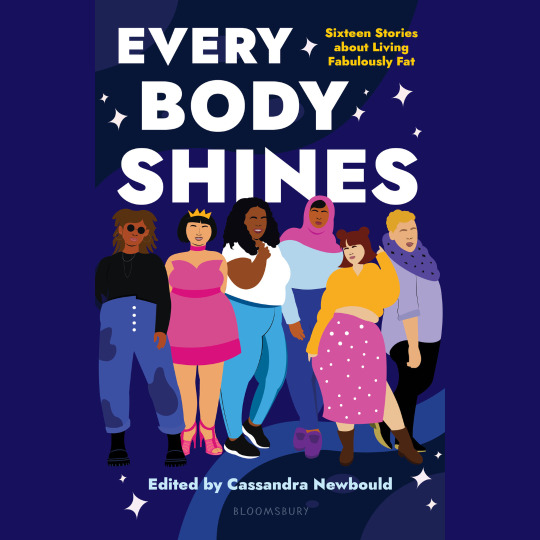
View On WordPress
#Alex Gino#amanda lovelace#Aubrey Gordon#body positivity#Cassandra Newbould#Catherine Adel West#Chris Baron#Claire Kann#Francina Simone#Hillary Monahan#Jennifer Yen#Kelly deVos#Linda Camacho#Monique Gray Smith#Nafiza Azad#Rebecca Sky#Renée Watson#Sheena Boekweg
4 notes
·
View notes
Text

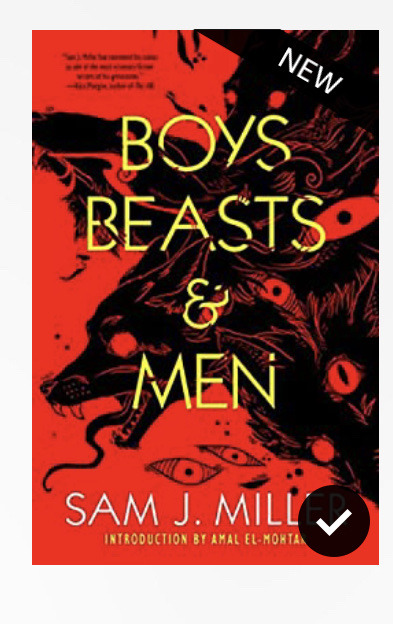

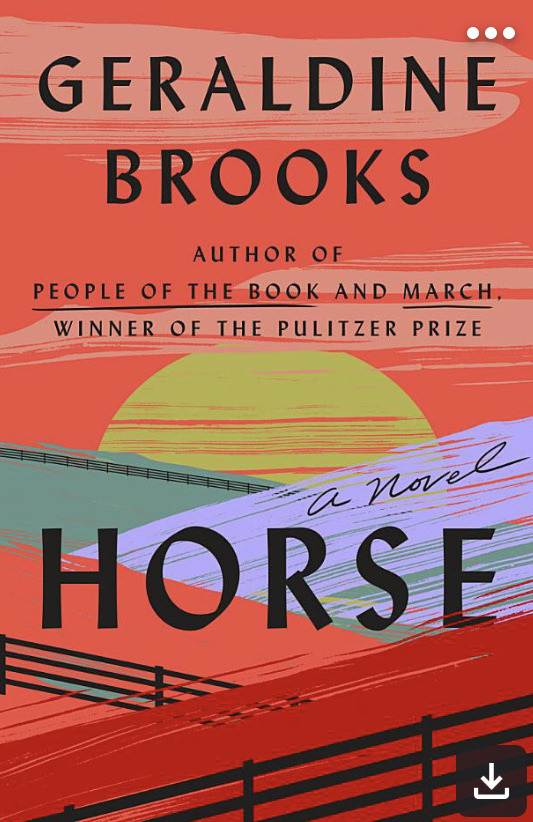
It’s new release Tuesday & I found myself unable to resist this colorful & eclectic pile!
@charlesemersonwinchesteriii one of these is just for (because) of you! ❤️
#queer fiction#sam j miller#geraldine brooks#kaitlyn tiffany#kelly devos#new release tuesday#my reading life
5 notes
·
View notes
Photo

currently reading
2 notes
·
View notes
Text
"I need money.
That's it.
I don't think these girls belong at a fat camp. Nobody does."
Okay so, Eat Your Heart Out is a horror satire book set at a fat camp.
The premise of this book, where the fat camp is creating zombies - was pretty much perfect. I loved how the book handled the conversation about weight and how it never made their characters be defined by being a fat character(?).
That said, a lot of this book was pure action, and a lot of the characters arc's suffers from this? The characters don't have much time to be fleshed out before they either die - the characters never subvert the tropes that they're defined as in the beginning of the book.
Q: Have you read books that take place in treatment centres/camps? How do you feel about those settings?
instagram
#readwithdee#bookblr#eat your heart out#kelly devos#fat camp#zombies#horror satire#Instagram#guess who is all caught up#aside from that one stupid reel i made
2 notes
·
View notes
Text

vivian come home the kids miss you 😘
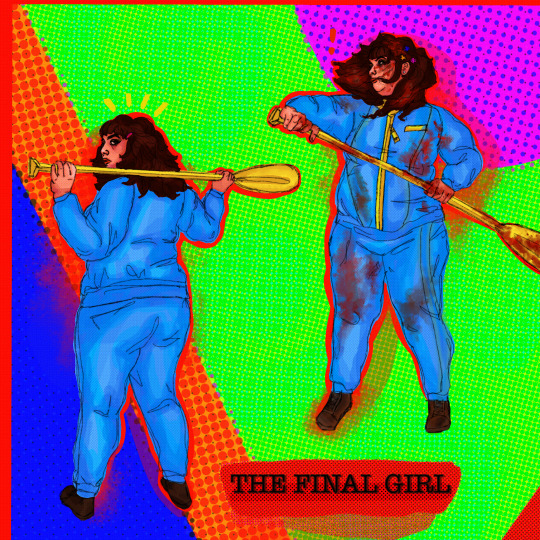
#more like my final girl#ammirite#vivian ellenshaw#eat your heart out#book fanart#booklr#fanart#final girl#kelly devos#my queen#tysm for letting me feel seen in a badass zombie killer#eyestrian#wlw art
4 notes
·
View notes
Text
Audiobook Mini Reviews Part One
Audiobook Mini Reviews Part One
Hi besties! I have been an audiobook listening machine lately! Here’s my first round up of what I’ve been listening to lately — with another round to come later this week! Any audiobook recommendations?
Zyla & Kai by Kristina Forest
Zyla & Kai by Kristina Forest was such a GOOD listen. I was RIVETED. This story follows the title characters through their love story. It opens when Zyla and Kai…
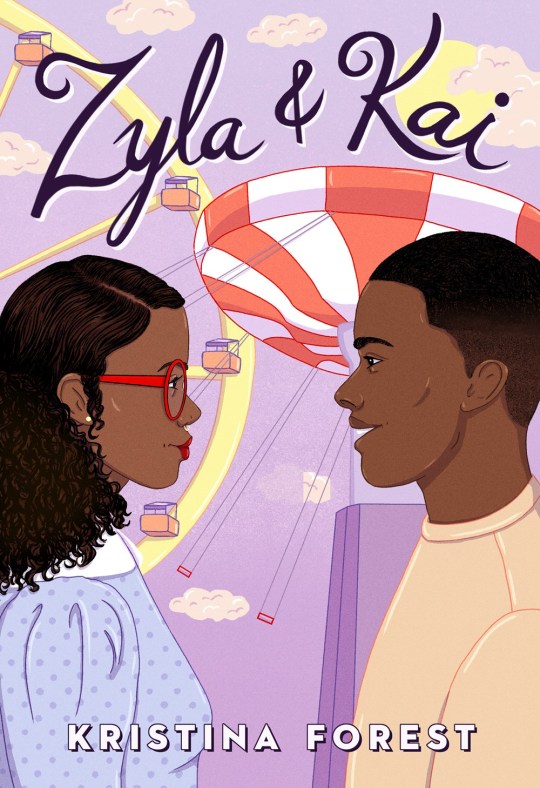
View On WordPress
#audiobook#Book Review#Contemporary#Frankie Corzo#horror#Jasmeen Kaur Deo#Kate M. Williams#Kelly deVos#Kimberly M. Wetherell#Kristina Forest#multicultural#Penguin#Tashi Thomas#Young Adult
0 notes
Text
Go Hunt Me by Kelly deVos (ARC Review)
Go Hunt Me by Kelly deVos (ARC Review)
Title: Go Hunt Me
Author: Kelly deVos
Type: Fiction
Genre: Young Adult, Fantasy, Horror, Paranormal, Mystery
Publisher:Razorbill
Date published: June 14, 2022
A complimentary digital copy of this book was kindly provided by the publisher in exchange for an honest review.
Alex Rush is ready for the trip of a lifetime.
She and her friends have made some creepily awesome films together throughout…
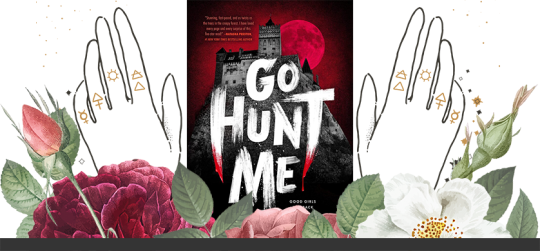
View On WordPress
#2022 book#2022 books#2022 release#2022 releases#advanced reader copy#book#book blog#book blogger#book review#book review blog#book reviews#books#go hunt me#horror#horror book#horror fiction#horror YA#kelly devos#paranormal book#paranormal YA#thriller#thriller book#ya book#YA horror#young adult#young adult book#young adult horror#young adult thriller#younga adult horror
0 notes
Text
Go Hunt Me - Kelly deVos

Alex Rush is ready for the trip of a lifetime.
She and her friends have made some creepily awesome films together throughout high school, so with only a few months left before they go their separate ways for college, they’re determined to make the best one yet: an epic short film that reimagines the story of Dracula, filmed on location at a remote castle in Romania.
But when they get there, it’s not quite the majestic setting they planned for. Menacing weapons line the walls, the twisted halls are easy to get lost in, and with no connection to the outside world, the group is unexpectedly off the grid. After just a few hours spent under its roof, Alex and her friends have no trouble imagining how this dark, terrifying castle inspired one of the most enduring horror novels of all time.
Only soon they no longer have to use their imaginations to understand the location’s terrifying history—just as they get the film’s first shot rolling, one of Alex’s friends disappears, and she’s nearly certain she saw a cloaked stranger lurking in the shadows. As more members of the group begin to meet an untimely demise, Alex is desperate to stop the bloodshed, even if it means facing a monster she never thought would be let loose.
tw: description of violence and corpses, fire
0 notes
Text
Schlocktoberfest XIII - Day 15: Night School
Night School (1981)
Trailer:
*Spoilers Throughout*
What’s This About: In her first film, Rachel Ward is caught up in a web of intrigue, gory murder, and getting raspberries smeared on her in the shower.
Here are some of my observations as I watched the film:
Welcome to Boston everyone. Go Celtics, but fuck the Pats and fuck the Sox.
I’m currently writing this on a semi-remote farm in Vermont…

View On WordPress
#Adrian Zmed#Boston#Casio#David Hyde Pierce#Devo#John Lennon#Kelly Leak#Kelsey Grammar#Mark David Chapman#Nail Gun Massacre#Patton Oswalt#Rachel Ward#Steven Keaton#The French Connection#Vermont#Whitechapel
0 notes
Text
Telehealth — Content Oscillator (Self-Release)

Photo by Mikayla Neves
Content Oscillator by Telehealth
Telehealth, out of the Seattle suburbs, makes retro-futurist new wave songs out of cheesy synths and drum machines, resuscitating the nostalgic sounds of Devo, the Human League and Eddy Grant, while critiquing the cutting-edge technologies of right this minute. Alexander Attitude (possibly a stage name) and Kendra Cox of Lemolo make up Telehealth (you can hear her on “Blinding Hour,” for instance). Content Oscillator is as idiosyncratic as a two-person, end-of-the-world, disco-sci-fi outfit can be, and it’s a non-stop bop all the way through.
Why not start where the record does with “Idiot Proof?” Its hammering one-note riff that sounds like a migraine coming on, the walls closing in, the nightmare turning real, but the synths dance around it in giddy joy and the chorus is as bright and twitchy as the Comstat Angels. It is followed by a song called “Hype Tech Green Investment Guy,” all taut, preening, late-1980s sheen, but with pokes at Alexa, tech dudes and private equity bros. (“Not a republican/fiscally conservative/exploit the system/watch it rot/I work hard, I’m not a cop.”)
“Taliesin Grid” is likewise, full of bounce and menace. It is possibly relevant here that Attitude trained as an architect—Taliesin is one of Frank Lloyd Wright’s buildings—and concerned with climate change, but not to the degree that it gets in the way. Telehealth has Devo’s way of packaging techno-dread in shiny danceable wrapping.
The disc ends with anthemic “Yr Groove,” where the synths bubble over in anxious, end-of-times hedonism. It’s a pneumatic groove, powered by renewables, irresistible and anthemic and devoted to self-actualization even in the direst times. “If things are ending/doesn’t mean I’m free/the world is burning, let me be me,” crows Alexander Attitude, and yes, here’s to the oddballs running wild.
Jennifer Kelly
#telehealth#content oscillator#jennifer kelly#albumreview#dusted magazine#disco#new wave#futurism#synths#dance pop#devo#sci-fi
1 note
·
View note
Text
(And in case you don’t have a NYT subscription, here they all are):
“We don’t take an oath to a country. We don’t take an oath to a tribe. We don’t take an oath to a king or a queen, or to a tyrant or a dictator. And we don’t take an oath to a wannabe dictator.” - Mark Milley
“The president has very little understanding of what it means to be in the military, to fight ethically or to be governed by a uniform set of rules and practices.” - Richard Spencer
“President trump and other officials have repeatedly compromised our principles in pursuit of partisan advantage and personal gain.” - HR McMaster
“Donald trump is the first president in my lifetime who does not try to unite the American people- does not even pretend to try. Instead, he tries to divide us. We are witnessing the consequences of three years of this deliberate effort.” - James Mattis
“ I have a lot of concerns about Donald trump. I have said that he’s a threat to democracy.” - Mark Esper
“ a person who admires autocrats and murderers dictators. A person who has nothing but contempt for our democratic institutions, our Constitution, and the rule of law.”- John Kelly
“ I think the events of the capital, however, they occurred, were shocking. And it was something that, as I mentioned in my statement, I cannot put aside.”- Elaine Chao
“Unfortunately, the actions and rhetoric following the election, especially during this past week, threaten to tarnish these and other historical legacies of this administration. The attacks on the Capital were an assault on our democracy, and on the tradition of peaceful transitions of power of the United States of America, brought to the world.”- Alex Azar
“Moron.” - Rex Tillerson (re: trump, repeatedly)
“It’s more than just a bunch of papers and what big deal is this and so forth. Lives can be lost.” - Dan Coats
“I didn’t feel he did what he needed to do to stop what was happening.” -Betsy DeVos (a stupid bitch overall, but still right)
“It will always be, ‘Oh, yeah, you work for the guy who tried to overtake the government.’” - Mick Mulvaney
“The fact of the matter is he is a consummate, narcissist, and he constantly engages in reckless conduct that puts his political followers at risk and the conservative and Republican agenda at risk.” -Bill Barr
“By the time I left the White House, I was convinced he was not fit to be president… I think it is a danger for the United States if he gets a second term.” -John Bolton
“We need more seriousness, less noise, and leaders who are looking forward, not staring in the rearview mirror claiming victimhood.” - Mike Pompeo
“He asked me to put him over the Constitution, and I chose the Constitution, and I always will.” - Mike Pence
“He went down a path he shouldn’t have, and we shouldn’t have followed him, and we shouldn’t have listened to him. And we can’t let that ever happen again.” - Nikki Haley
Stupid. Selfish. Divisive. Authoritarian. Unserious. Tyrant. Professional Victim. Insurrectionist. Narcissist. Dangerous. Moron.
Trump’s best people sum him up.
82 notes
·
View notes
Text
Trump's People
“The American people deserve to know that President Trump asked me to put him over my oath to the Constitution. … Anyone who puts himself over the Constitution should never be president of the United States.”
— Mike Pence, Trump's vice president
“Someone who engaged in that kind of bullying about a process that is fundamental to our system and to our self-government shouldn’t be anywhere near the Oval Office.”
— Bill Barr, Trump's 2nd attorney general
“Donald Trump is the first president in my lifetime who does not try to unite the American people — does not even pretend to try. Instead he tries to divide us.”
— James Mattis, Trump's 1st secretary of defense
“I think he’s unfit for office. … He puts himself before country. His actions are all about him and not about the country. And then, of course, I believe he has integrity and character issues as well.”
— Mark Esper, Trump's 2nd secretary of defense
“We don’t take an oath to a wannabe dictator. We take an oath to the Constitution and we take an oath to the idea that is America – and we’re willing to die to protect it.”
— retired Gen. Mark Milley, Trump's chairman of the joint chiefs
“(Trump’s) understanding of global events, his understanding of global history, his understanding of US history was really limited. It’s really hard to have a conversation with someone who doesn’t even understand the concept for why we’re talking about this.”
— Rex Tillerson, Trump's secretary of state
“He used to be good on foreign policy and now he has started to walk it back and get weak in the knees when it comes to Ukraine. A terrible thing happened on January 6, and he called it a beautiful day.”
— Nikki Haley, Trump's 1st ambassador to the United Nations
“Someone who I would argue now is just out for himself.”
— Chris Christie, Trump's presidential transition vice-chairman
“We saw the absence of leadership, really anti-leadership, and what that can do to our country.”
— HR McMaster, Trump's 2nd national security adviser
“I believe (foreign leaders) think he is a laughing fool.”
— John Bolton, Trump's 3rd national security adviser
“A person that has nothing but contempt for our democratic institutions, our Constitution, and the rule of law. There is nothing more that can be said. God help us.”
— John Kelly, Trump's 2nd chief of staff
“I quit because I think he failed at being the president when we needed him to be that.”
— Mick Mulvaney, Trump's acting chief of staff and US special envoy to Ireland, resigned after January 6th, 2021
“He is the domestic terrorist of the 21st century.”
— Anthony Scaramucci, one of Trump's former communications directors
“I am terrified of him running in 2024.”
— Stephanie Grisham, another former communications director
“When I saw what was happening on January 6 and didn’t see the president step in and do what he could have done to turn it back or slow it down or really address the situation, it was just obvious to me that I couldn’t continue.”
— Betsy DeVos, Trump's secretary of education, resigned after January 6th, 2021
“At a particular point the events were such that it was impossible for me to continue, given my personal values and my philosophy."
— Elaine Chao, Trump's secretary of Transportation, resigned after January 6th, 2021
“…the president has very little understanding of what it means to be in the military, to fight ethically or to be governed by a uniform set of rules and practices.”
— Richard Spencer, Trump's 1st secretary of the Navy
“The President undermined American democracy baselessly for months. As a result, he’s culpable for this siege, and an utter disgrace.”
— Tom Bossert, Trump's 1st homeland security adviser
“Donald’s an idiot.”
— Michael Cohen, Trump's former personal lawyer and fixer
“Trump relentlessly puts forth claims that are not true.”
— Ty Cobb, Trump's White House lawyer
“We can stand by the policies, but at this point we cannot stand by the man.”
— Alyssa Farah Griffin, one of Trump's directors of strategic communications, now a CNN political commentator
“Donald Trump, who would attack civil rights icons and professional athletes, who would go after grieving black widows, who would say there were good people on both sides, who endorsed an accused child molester; Donald Trump, and his decisions and his behavior, was harming the country. I could no longer be a part of this madness.”
— Omarosa Manigault Newman, a top aide in charge of Trump's outreach to African Americans
“I thought that he did do a lot of good during his four years. I think that his actions on January 6 and the lead-up to it, the way that he’s acted in the aftermath, and his continuation of pushing this lie that the election is stolen has made him wholly unfit to hold office every again.”
— Sarah Matthews, one of Trump's deputy press secretaries, resigned after January 6th, 2021
“I think that Donald Trump is the most grave threat we will face to our democracy in our lifetime, and potentially in American history.”
— Cassidy Hutchinson, Trump's final chief of staff’s aide
#uspol#politics#us politics#trump#american politics#2024 election#trump 2024#president trump#america first
16 notes
·
View notes
Text
Cabinet Endorsements
One thing that's flown a bit below the radar in this election is that former cabinet members haven't been acting like they usually do. Normally, former cabinet members will automatically endorse their former boss for re-election, but Trump's have not been doing that.
This is of particular interest because, while we, the voters, get to see the President give speeches and the like, we don't actually work with him. Presumably a cabinet member is someone who agrees with the president and who the president trusts and who gets to work closely with the president, so their opinion of the president is an important benchmark.
With that in mind, let's take a look at the 44 former cabinet members of the Donald J. Trump administration and the 2 former cabinet members of the Joseph R. Biden administration. I'll put an (E) next to the ones that have endorsed their former boss, an (H) next to the ones who haven't yet, and an (R) next to the ones who have outright refused to do so.
Cabinet Members of the Donald J. Trump Administration
(R) VP Mike Pence
(H) Sec. State Rex Tillerson
(H) Sec. State/CIA Director Mike Pompeo
(E) Sec. Treasury Steven Mnuchin
(R) Sec. Defense James Mattis
(H) Sec. Defense Patrick Shanahan (nominated)
(R) Sec. Defense Mark Esper
(H) Sec. Defense Christopher Miller (acting)
(H) AG Jeff Sessions
(R) AG William Barr
(H) AG Jeffrey Rosen (acting)
(E) Sec. Interior Ryan Zinke
(H) Sec. Interior David Bernhardt
(H) Sec. Agriculture Sonny Perdue
(E) Sec. Commerce Wilbur Ross
(H) Sec. Labor Andrew Puzder (nominated)
(H) Sec. Labor Alex Acosta
(H) Sec. Labor Eugene Scalia
(H) Sec. HHS Tom Price
(H) Sec. HHS Alex Azar
(H) Sec. HHS Pete Gaynor
(E) Sec. HUD Ben Carson
(H) Sec. Transporation Elaine Chao
(H) Sec. Transportation Steven Bradbury (acting)
(H) Sec. Energy Rick Perry
(H) Sec. Energy Dan Brouillette
(H) Sec. Education Besty DeVos
(H) Sec. Education Mick Zais (acting)
(H) Sec. VA David Shulkin
(E) Sec. VA Ronny Jackson (nominated)
(H) Sec. VA Robert Wilkie
(R) Sec. HS John Kelly
(H) Sec. HS Kirstjen Nielsen
(H) Sec. HS Chad Wolf (nominated)
(E) US Trade Rep. Robert Lighthizer
(H) DNI Dan Coats
(H) DNI John Ratcliffe
(H) UN Ambassador Nikki Haley
(H) OMB Directory Mick Mulvaney
(E) OMB Director Russel Vought
(H) CIA Director Gina Haspel
(H) EPA Admin. Scott Pruitt
(H) EPA Admin. Andrew Wheeler
(H) SBA Admin. Linda McMahon
(H) SBA Admin. Jovita Caranza
Cabinet Members of the Joseph R. Biden Administration
(E) Sec. Labor Marty Walsh
(E) OMB Director Neera Tanden (nominated)
(H) Office of Science and Tech. Director Eric Lander
The first thing we notice, obviously, is that there are a whole lot more former Trump cabinet members. This is partially because Biden is still in office so his 23 current cabinet members are not counted (it'd be a huge surprise if they didn't endorse him and they probably wouldn't still be working for him if they didn't), but it's also because Trump had way above average turnover for cabinet officials, 19 in the first four years not including the 5 who resigned due to his handling of the 2020 election results (not included because Biden hasn't reached that point in his first term yet), while Biden has had far below average turnover, only 3 so far.
So a lot more people shuffling in and out of the Trump administration, but we also notice a ton more H's than E's there. Heck, there's almost as many R's among Trump's people as there are E's (5 to 7). Meanwhile, Biden's shooting 2 for 3 and the third one hasn't (at least not that I could find) ruled out endorsing him.
Keep in mind, endorsing the nominee of your party is pretty much the bare minimum that any party operative needs to do. Imagine if you applied for a job somewhere, the first question was "do you think this company should be in business", and you answered "no". You probably wouldn't be getting a job there. In other words, refusing to endorse has some big consequences for the people doing it, not just costing them a job in the potential next Republican presidency, but locking them out of the party entirely, and yet a good deal of the people who worked for Trump disliked working with him so much that they're doing it anyways.
As I said, this tends to fly below the radar because it's kind of a formulaic ritual; of course members of the President's party who are closely tied to him are going to endorse him for re-election! That's why you should pay attention now that most of the people who've worked with Trump aren't doing so. It says something, something big.
17 notes
·
View notes
Text
Aaron Lange, Peter Laughner, and the Terminal Town of Cleveland, Ohio
Cleveland-based artist, Aaron Lange, tackles his first graphic novel, Ain't It Fun -- a deep dive into the oily depths of the Rust Belt's most influential music town, it's most mythological misfit, it's oft-forgotten artistic and political streaks, and beyond...
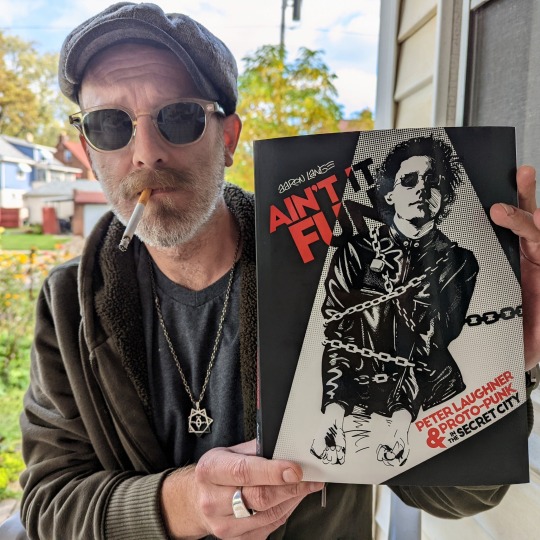
Aaron Lange and his book, 2023 (Photo by Jake Kelly)
--------------------------------------
There’s a recurring line in Aaron Lange’s remarkable new graphic novel, Ain’t It Fun (Stone Church Press, 2023), that states, “Say the words out loud. The River isn’t real.” The river Lange was speaking of is the Cuyahoga, that infamously flammable mass of muck that dumps out into Lake Erie.
Peter Laughner (the ostensible topic of Lange’s book) was an amazing artist who probably could’ve ditched the banks of the Cuyahoga for more amenably artistic areas back in his early 1970s heyday. Aside from his frequent pilgrimages to the burgeoning NYC Lower East Side scene (where he nearly joined Television) and a quickly ditched attempt to live in California though, he mostly stuck around northeast Ohio.
While desperately trying to find his sound and a workable band, Laughner smelted a post-hippie, pre-punk amoebic folk rock, and formed the influential embryonic punk band, Rocket from the Tombs, which later morphed into Pere Ubu. All of which – lumped up with other rust-belted oddballs like electric eels, Mirrors, DEVO, the Numbers Band, Chi-Pig, Tin Huey, Rubber City Rebels, and more – essentially helped formed the “proto-punk” template.
youtube
Laughner was also a rock writer of some regional renown, and contributed numerous amphetamine-fueled articles to regional mags like The Scene and Creem -- mostly concerning where Rock'n'Roll was going, colored as he was by the Velvet Underground, the Stooges, David Bowie, and Roxy Music playing in Cleveland a bunch of times around his formative years.
Sadly, in June 1977, Laughner died of acute pancreatitis at age 24. Aside from the first two seminal Pere Ubu 7-inch singles, the rest of Laughner’s recorded output was just one very limited self-released EP and, posthumously, a great double-LP comp of demo and live tracks, Take the Guitar Player for a Ride (1993, Tim Kerr Records). A surprisingly large batch of unreleased lost demos, radio shows, and live tapes appeared on the beautiful and essential box set, Peter Laughner (Smog Veil Records, 2019), that brought Laughner’s legend just a few blocks outside of Fringeville, as it received universally great reviews….
youtube
The Dead Boys became the most well-known act of that mid-70s Cleveland scene, though that only happened once they high-tailed it to NYC. Aside from DEVO, Chrissie Hynde, and the Waitresses (all of whom did their own versions of high-tailing it), nearly every other act in that fertile Cle-Akron proto-punk vortex soon dissipated, eventually getting the cult treatment at best.
Cleveland is indeed right there with NYC and London as punk ground zero, but Americans tend to equate buyable products as proof of import, so shockingly, the Pagans and The Styrenes just aren’t the household name they should be.
Decades of tape-trading stories, sub-indie label limited releases, and fanzine debates kept the mythology of those acts barely breathing underneath the end of the milennium’s increasingly loud R'n'R death knell. And as that mythology slowly grew, the fans and even the musicians of the scene itself still wonder what it all meant.
Which, as you dig deeper into Ain’t It Fun, becomes the theme not just about the legendary rocker ghost of Peter Laughner, but of Cleveland itself. Ala Greil Marcus’ classic “hidden history” tome, Lipstick Traces, Lange interweaves Laughner’s self-immolating attempts at Beatnik-art-punk transcendence with a very detailed history of Cleveland, with its insane anti-legends and foot-shooting civic development.
Like much of the dank, rusted, and mysterious edges of the one-time “Sixth City,” the Cuyahoga has been cleaned up since, though I still wouldn’t suggest slurping up a swallow if you’re hanging on the banks of the Flats. I grew up in Cleveland and visit as often as I can because it’s an awesome place, no matter what they tell you. Or maybe, because of what they tell you.
If you are keen to swim down through the muck and mire of Cleveland’s charms, you don’t just get used to it, you like it. As for the “Cleveland” that the City Fathers have always tried so vainly to hype, us hopelessly romantic proto-punk fanatics say to those who would erase Cleveland’s fucked-up past and replace it with that weird fake greenspace underneath the Terminal Tower: “The City isn’t real.”
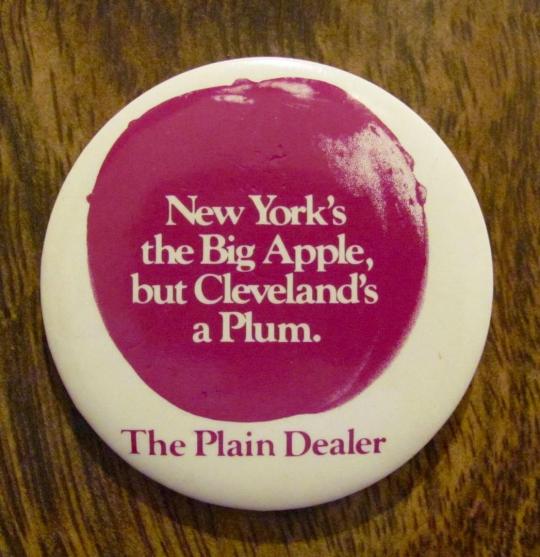
-------------------------------------
Give us a quick bio.
Born in Cleveland, 1981. We moved to the west side suburbs when I was six. My parents didn’t listen to much music, and I don’t have older siblings. So I didn’t really listen to music at all until I was in high school, and I didn’t listen to any of the grunge or ‘90s stuff that was popular. I got real into the Beatles when I was in ninth grade, and at some point I got the Velvet Underground’s first album from the library because I saw Andy Warhol’s name on the cover. I didn’t know anything about them, so that was a real shock. I probably first heard Iggy Pop via the Trainspotting soundtrack, and pretty soon after I started getting into punk and generally more obscure stuff. Now I listen to more electronic stuff, ambient stuff. I also like most anything that falls under the broad “post-punk” umbrella. I really hate “rama-lama ding-dong” rock and roll.
What came first – music or drawing interest?
Drawing. I was always drawing… I’ve been a semi-regular contributor to Mineshaft for many years, which is a small zine/journal that features a lot of underground comix related stuff, but also has a beatnik vibe and includes poetry and writing. I’ve done the odd thing here and there for other zines, but I don’t really fit in anywhere.
Don’t really fit it – I feel that phrase describes a lot of the best / more influential Ohio musicians / bands. Did you feel that kind of feeling about Peter as you researched and wrote the book?
Peter was well liked, and he knew a vast array of people. If anything, he fit in in too many situations. He was spread thin.
When you lived in Philly, did you get a sense of any kind of similar proto-punk scene / era in that town? I sometimes, perhaps jingoistically, think this particular kind of music is almost exclusively confined to the Rust Belt.
I lived in Philly for nearly 11 years. As far as the old scene there, they had Pure Hell. But back then, anybody who really wanted to do something like that would just move to NYC.
So, is there a moment in time that started you on a path towards wanting to dig into Cleveland’s proto-punk past like this?
It was just something I had a vague interest in, going back to when I first heard Pere Ubu. And then later learning about the electric eels, and starting to get a feeling that Cleveland had a lot more to offer than just the Dead Boys. The Rocket from the Tombs reunion got things going, and that’s when I first started to hear Laughner’s name. A few years later, a friend sent me a burned CD of the Take the Guitar Player for a Ride collection, and I started to get more interested in Peter specifically.
Despite any first wave punk fan’s excitement about a Laughner bio, this book is moreso a history of Cleveland, and trying to connect those odd underground, counterculture, or mythological connections that the Chamber of Commerce tends to ignor as the town’s import. Was there a moment where you realized this book needed to go a little wider than only telling the tales of Laughner and the bands of that era? (Not that there’s anything wrong with that!)
Very early on I realized that none of this would make sense or have any true meaning without the appropriate context. The activities of the early Cle punk scene need to be viewed in relation to what was going on in the city. I think this is just as true with NYC or London – these were very specific contexts, all tangled up in politics, crime, rent, television, and also the specifics of the more hippie-ish local countercultures that preceded each region. You’ve got Bowie and Warhol and all that, but in Cleveland you’ve also got Ghoulardi and d.a. levy. Mix that up with deindustrialization and a picture starts to form.
youtube
So when did you decide on doing this book? You’ve mentioned this was your first attempt at doing a full graphic novel – and boy, you went epic on it!
I did a short version of Peter’s story back when I was living in Philadelphia. But upon completing that version – which I now think of as a sketch – it became clear that there was a lot more to say and to investigate. I spent about a year just thinking about it, forming contacts with some people, and tracking down various reference materials like records, zines, books, etc. Then my wife got a new job at Cleveland State University, so we left Philly. Once I landed back in Cleveland I started working on the book in earnest.
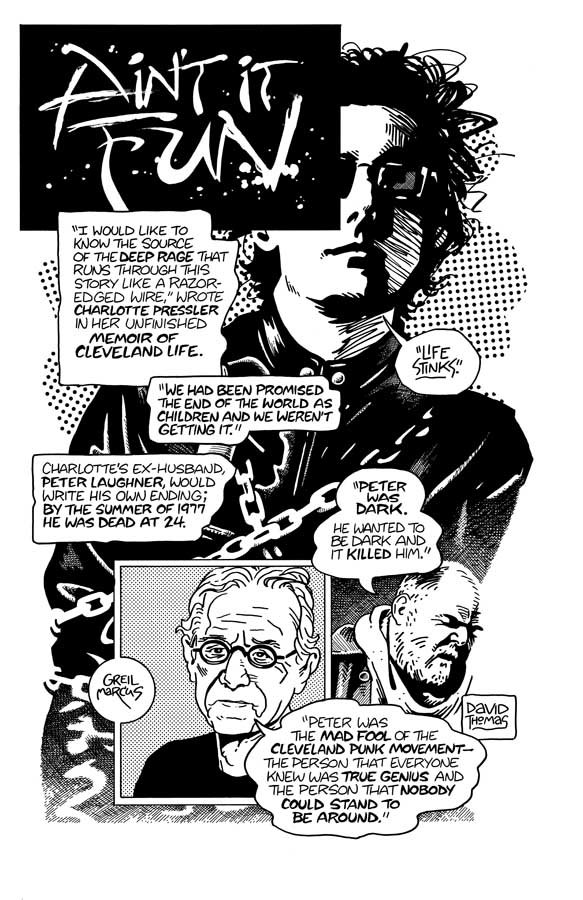
Page from Ain't It Fun -- all book images courtesy of the author.
By any chance was Greil Marcus’ book, Lipstick Traces (1989), an inspiration, as far as the “hidden history” factor, the trying to connect seemingly unconnected and lost historical footnotes into a path towards the culture’s future?
Yes. I read Lipstick Traces when I was around 19 or 20, and I’d never seen anything like it before. It really blew my mind, all the stuff about the Situationists and Dadaists and all that. Later on, I read Nick Tosches’ Dean Martin biography, Dino, and that was another mind blower. Another major influence is Iain Sinclair.
Ah Dino, another Ohio native. So, Laughner’s one-time partner, Charlotte Pressler’s book is mentioned, and I’ve seen it referenced and talked about for years – any inside word on if/when she might have that published?
Charlotte never wrote a book, though she did co-edit a book that collected the work of local poets. As far as her own writing, she’s done all manner of essays and poetry, and probably some academic writing that I’m not familiar with. As far as her completing “Those Were Different Times”— which was intended as a total of three essays— I’ve got some thoughts on that, but it’s not really my place to comment on it.
Pressler sounds like a very serious person in your book, as you say, she was kind of older than her years. But how was she to talk to?
Charlotte is serious, but she’s not dour. She’s got a sense of humor and she’s very curious about the world, always looking to learn new things. She’s an intellectual, and has a wide array of interests. We get along, we’re friends.
The fact that the town’s namesake, Moses Cleveland, left soon after his “discovery” and never came back – that’s like a template for how people envision a town like Cleveland: nice place to grow up, but you want to get out as soon as you’re legal. Even the musicians of the area might’ve agreed with that sentiment, even if many never left. Do you think that has changed?
I’m glad I left Cleveland, but I’m also glad I came back. First off, my family is here. Second, the cost of living is still reasonable. I don’t know how people live in New York. I never have any money. I’d make more money if I had a full-time job at McDonald’s. That’s not a joke, or me being self-deprecating. How do artists live in New York? How do they afford rent and 20 dollar packs of cigarettes? I’m just totally confused by the basic mechanics of this. So yeah, I’m in Cleveland. It’s not great, but what are my options? I can’t just go to Paris and fuck around like a bohemian. I would if I could.
In Ain't It Fun, you reveal that one of the seminal Cleveland scene dives, Pirate's Cove, was once a Rockerfeller warehouse – these kind of enlightening, almost comically perfect metaphors pop up every few pages. Not unlike the mythology that can sometimes arise in musician fandom, I wonder if these are metaphors we can mine, or just an obvious facts that the town drifted down from a center of industry to relative poverty.
“Metaphor” might be at too much of a remove. These facts, these landmarks — they create a complex of semiotics, a map, a framework. The city talks through its symbols and its landscape. If you submit to it and listen, it will tell you secrets. There is nothing metaphorical about this.
Is it a sign of privilege to look on destitution as inspiration? I’m guessing the sick drunks at Pirate’s Cove in 1975 weren’t thinking they were living in a rusty Paris of the ‘30s. Though I will say a thing I really loved about your book was that, for all its yearning and historical weaving, you still stick to facts and don’t seem to over-mythologize or put any gauze on the smog, like “Isn’t that so cool, man.” You capture the quiet and damp desperation of that era and Laughner’s milieu.
Poverty, decline, decay, entropy – these things are real. By aestheticizing them we are able to gain some control over them. And once you have control, you have the power to change things. This is not “slumming.” “Privilege” has nothing to do with it.
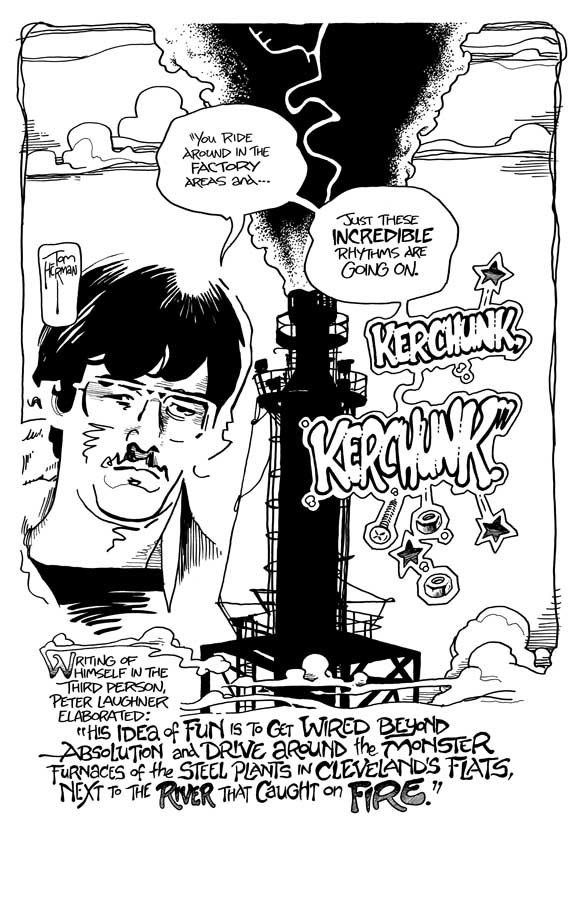
Page from Ain't It Fun
Do you know why the Terminal Tower (once the second tallest building in the world when it opened in 1928) was named that? It seems somewhat fatalistic, given the usual futurist positivism of the deco design era.
Terminal as in train terminal. It really pisses me off that there was once a time where you could go there and catch a train to Chicago or New York. It’s infuriating how this country dismantled its rail systems. And the Terminal Tower isn’t deco, but I think it is often confused with that style just by virtue of not being a gigantic rectangle. In that sense it does have more in common with a deco structure like the Chrysler building. Honestly, if you are looking for deco you might find more notable examples in Akron than you would Cleveland.
I notice a kind of – and bear with my lesser abilities to describe illustrative art – swirly style in your work that kind of aligns with art deco curves, maybe some Gustav Klimt…? In general, who were some illustrative inspirations for you early on?
That “swirly” style you describe is art nouveau. Deco came after that, and is more angular and clean. Additionally, a lot of underground comix guys were also poster artists, and there was often a nouveau influence in that psychedelic work – so there’s a bit of a thread there. As far as Klimt, I came to him kinda late, but I love him now.
The music of many northeast Ohio bands of that era has been generally tagged as “industrial” (the pre-dance industrial style, of course), cranky like the machinery of the sputtering factories in the Flats, etc… My guess is maybe the musicians were already finding used R'n'R instruments in thrift stores by that time, which would add a kind of layer of revision, turning old things into new sounds. Did you hear about of any of that? Or were there enough music stores around town? I know DEVO was already taking used instruments and refitting them; or electric eels using sheet metal and such to bang on…
I’m not a musician, so I don’t know anything about gear or stuff like that. I do know that Allen Ravenstine made field recordings in the Flats, and utilized them via his synthesizer. Frankly, I wish more of the Northeast Ohio bands had taken cues from Ubu and early Devo, because an “industrial” subculture definitely could have formed, like it did in England and San Francisco. But that never really happened here.
youtube
That kind of music was pretty popular on college radio and in a few clubs in Cleveland, though not many original bands with that sound arrived, aside from Nine Inch Nails who quickly took his act elsewhere… So in the book you mention local newsman, Dick Fealger. My memories of him are as a curmudgeon whose shtick was getting a little old by the time I was seeing him on the news, or his later opinion columns. Kinda your classic “Hey you kids, get off my lawn” style. You rightly paint him as a somewhat prescient reporter of the odd in his earlier days, though. I once had to go to a friend’s mother’s funeral, and in the next room in the funeral home was Dick Feagler’s funeral. I always regret not sneaking over and taking a peak into it to see who was there.
I like Feagler in the same way that I liked Andy Rooney on 60 Minutes. These were people that my grandparents liked. So I suppose my appreciation for Feagler is half nostalgia, half irony. I like cranks, grumps, letter-writers, street prophets. I like black coffee, donuts, diners, and blue plate specials – that’s Feagler’s world, the old newspaper world. Get up at 6 am and put your pants on, that kinda thing.
Yeah, I still found Feagler kinda funny, but like Jane Scott, while respect was always there, by the later ‘80s/’90s, both were set into almost caricatures who were kind of resting on their laurels.
Yeah, I remember seeing Jane at some random Grog Shop show back in the ‘90s, and I was kinda impressed. But no, she was never really cool. Jane was pure Cleveland, her career couldn't have happened anywhere else.
I remember seeing her sit right next to a huge house amp at the old Variety Theater for the entire duration of a Dead Kennedys show, taking notes for her review. Pretty impressive given her age at that point.
You also make a point of carving out an important space for The Damnation of Adam Blessing, a band that seems to get forgotten when discussing Cleveland’s pre-punk band gaggle. I find that interesting because in a way, they are the template for the way many Ohio bands don’t fit into any exact genre, and so often people don’t “get” them, or they’re forgotten later.
Damnation worked as a good local example for that whole psychedelic thing. They were very ‘60s. While the James Gang on the other hand, was more ‘70s— the cracks were starting to show with the ‘70s bands, they were harder and less utopian. Damnation feels more “Woodstock,” so they were useful to me in that regard.
I must add – for years I thought it was pronounced Laugh-ner, as in to laugh, ha ha, not knowing the Gaelic roots. Once I learned I was pronouncing it wrong, I still wanted to pronounce it like laughing, as it seemed to fit so darkly correct with how his life went, and Cleveland musicians’ love of bad puns and cheap comedians and such… Of course when I learned that it was an “ethnic” name, it made it that much more Cleveland.
Yeah, everybody says his name wrong. I used to too, and had to really force myself to start saying it as Lochner. But everybody says Pere Ubu wrong as well – it’s Pear Ubu.
I hate any desecration of any artwork, but I always loved the blowing up The Thinker statue story, as it seemed such a powerful metaphor of the strength of art, and Cleveland itself – the fact that The Thinker himself still sits there, right on top of the sliced-up and sweeping shards from the blast. It’s still there, right? And isn’t it true that there are like three more “official” Thinker statues in the world?
Yeah, I don’t condone what happened, but it is kinda cool. As a kid, the mutilated Thinker had a strong effect on me — I couldn’t have put it into words at the time, but I think it gave me a sense of the weight of history. It’s almost like a post-war artifact in Europe, something that is scarred. And yes, it’s still there outside the museum. And it’s a cast. I think there might be five official ones, but I’d have to look that up. If you are ever in Philadelphia, swing by the Rodin museum and check out The Gates of Hell.
I have only become a bigger fan of Laughner’s as the years pass. But there is something to the critique that perhaps he never really found his singular sound; that he was copping bits from Lou Reed and Dylan, and couldn’t keep a band together to save his life. And there was supposedly a feeling among some in the NYC scene that he was a bit of a carpetbagger.
youtube
Everybody has their influences, so Peter wasn’t in any way unique in that sense. I know he has a reputation for doing a lot of cover songs — which is true — but he also wrote a lot of originals, and there are some damn good ones which are still unreleased. “Under the Volcano” is just one such unheard song which I mention in my book, but there are others. As far as finding his own singular sound, he probably came closest to that with Friction. That group borrowed heavily from Television and Richard Hell, but also drew upon Richard Thompson and Fairport Convention. And when you think about it, those were really unlikely influences to juxtapose, and it created something original. Frustratingly though, Friction never achieved their full potential, as Peter was already losing it.
Yeah, Friction is kind of way up there with the “What if” bands… It’s interesting that for all his legend as a proto-punk figure, perhaps Laughner’s signature songs – Sylvia Plath” and “Baudelaire” – were gorgeous acoustic numbers. Though of course those early Pere Ubu songs were proto-punk and post-punk templates, somehow...
youtube
I honestly don’t know what happened with Ubu, as it is pretty distinct from Peter’s other work. Thomas isn’t really a musician, so we can only give him so much credit with how that sound developed. I honestly don’t know. There just must have been some sort of alchemy between the various players, and Thomas understood it and was able to encourage and guide it in the projects that followed over the years.
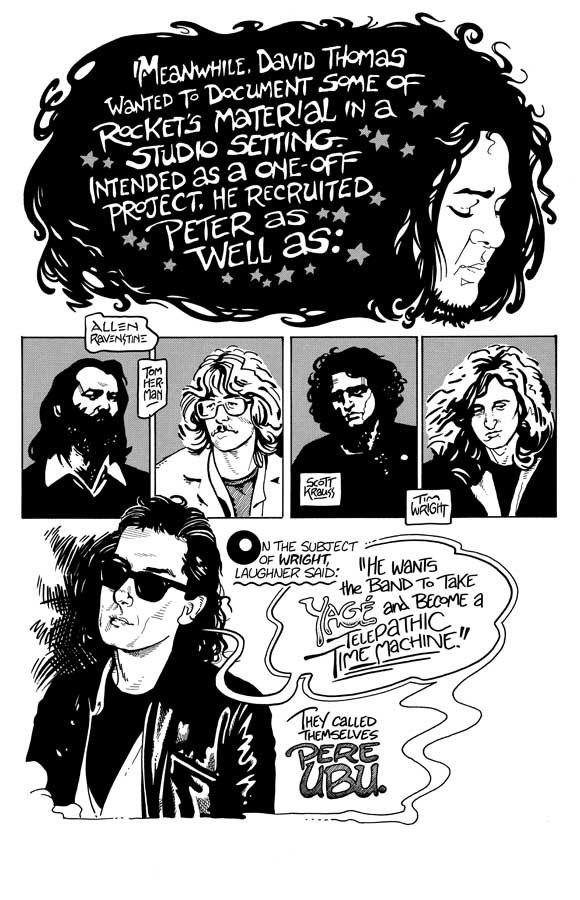
Page from Ain't It Fun
You also didn’t really detail Pere Ubu’s initial breakup – was there just not much to say?
Yeah, I think I mentioned it, but no, I didn’t really get into it. Pere Ubu is kind of a story unto themselves. But it might be worth mentioning here that Home and Garden was an interesting project that came out of that Ubu breakup. And Thomas also did some solo albums, but I’m not as familiar with those.
youtube
Yeah, I saw Home and Garden a few times way back, good stuff. You’ve mentioned to me that there were some people that didn’t want to talk to you for the book; and that people were very protective of Peter’s legacy and/or their friendship with him. To what do you attribute that?
It has everything to do with Peter’s early death. Some people are very protective of how Peter is remembered. And I think some people weren’t exposed to Peter’s dark side, so when they hear those descriptions of him it strikes them as untrue. I think Peter showed different sides of himself to different people.
I kind of felt as I was reading that you might say more about Harvey Pekar, as not only is he an interesting figure, but the most famous graphic novelist from Ohio, and I assume an inspiration of your’s.
Pekar’s great. Especially the magazine-size issues he was doing in the late ‘70s up through the ‘80s. It was important to me to include him in the book. But Pekar was a jazz guy, and that’s a whole other story, a whole other tangled web.
So, Balloonfest! Hilarious. I almost forgot about that. But I do remember Ted Stepien owning the short-lived Cleveland professional softball team; and for a promotion, they dropped softballs off the Terminal Tower, and if you caught one you won $1,000 or something. Do you recall that? It’s one of my favorite fucked-up Cleveland stories. Balls smashed car roofs, and cops immediately told people to run away.
youtube
Yeah, I’m aware of that baseball stunt. I generally try and stay away from anything even remotely related to professional sports teams — it gets talked about more than enough elsewhere. Oddly, I am interested in athletes who work alone, like Olympic skiers. I’m attracted to that solitary focus, where the athlete isn’t competing against other teams or players, but more competing with the limits of the human body, competing with what the physical world will allow and permit, that whole Herzog trip. I’m also interested in the Olympic Village, as this artificial space that mutates and moves across time and across continents.
As far as Balloonfest, I still watch that footage all the time. I use it as a meditation device. I’ll put it on along with Metal Machine Music and go into a trance.
youtube
A few years ago, as I am sure you are well aware, noted British punk historian Jon Savage put together a Soul Jazz Records comp of Cleveland proto-punk called Extermination Nights in the Sixth City. I grew up in Cleveland, lived in Columbus for awhile, and I never heard it called “the Sixth City.” Have you? If so, what does it refer to?
Nobody calls it that anymore. It’s an old nickname back from when Cleveland was literally the sixth largest city in the country.
I’d guess Ain’t It Fun was a tiring feat to accomplish. But do you have another book in the works? And if someone wanted to option Peter’s story for a movie, would you sign on? I personally dread rock biopics. They’re almost universally bad.
Yeah, I’ve got an idea for another book, but it’s too early to talk about that. As far as biopics, they are almost always bad, rock or otherwise. Rock documentaries are often pretty lousy too. A recent and major exception would be Todd Haynes’ Velvet Underground documentary, which is just goddamn brilliant. A film about Peter in that vein would be great— but there’s just no footage to work from. He didn’t have Warhol or Factory people following him around with a camera. So unless somebody like Jim Jarmusch comes calling, I won’t be signing off on movie rights any time soon.
Unless there is more you’d like to say, thanks, and good luck with the book and future ventures!
Stone Church Press has a lot of projects planned for 2024 and beyond, and I encourage anyone reading this to support small publishers. There is a lot of very exciting stuff going on, but you have to work a little to find it. Amazon, algorithms, big corporate publishers — they’re like this endless blanket of concrete that smothers and suffocates. But flowers have a way of popping up between the cracks.
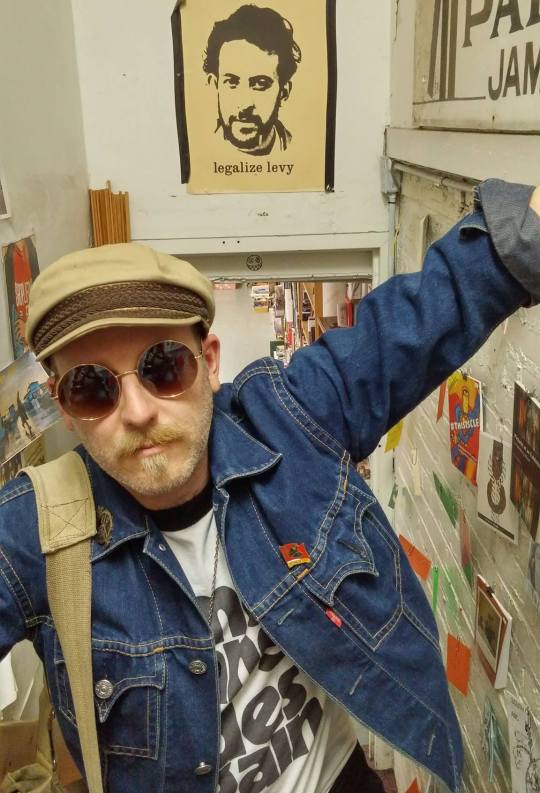
Aaron Lange, 2023 (Photo by Jake Kelly)
#punk#cleveland punk#velvet underground#peter laughner#pere ubu#protopunk#clevelandrocks#cleveland#devo#nycpunk#1970s rock#aint it fun#Ghoulardi#smog veil#guns n roses#ohio punk#ohio#punk rock#garage punk#biographies#eric davidson#lou reed#television#dead boys#rocket from the tombs#Youtube
17 notes
·
View notes
Text
books books
in 2021 i found reading again thru lots of romance novels
and in 2022 i would say i returned to eating a more hearty balanced diet
here’s my most favorite to talk about
semiosis by sue burke - {SFF} generational tale of exodus ship settlers on hostile alien planet and their relationship with the sentient plant life there. oooh baby. this was the first really juicy book i read this year, and the first sci-fi i had really loved in a while. i kept thinking i knew what this book was going to be about, and then it kept pulling out the rug from under me in really satisfying ways. ended up being thematically related to a lot of other SFF i read thru the rest of the year in an exciting, brain-using way.
culture war lords by tal lavin - {non-fiction} i think part of this was so resonant bc of how i listened to it as an audiobook (in snatches while watching my nanny kids play on the playground, or while heaving their stroller up hill through the streets of jerusalem.) i wanted to talk about it with my mom, but i don’t want my mom to hear the awful things in this book.
the just city by jo walton - {SFF} athena takes nerds through time and kidnapped children to build plato’s just city. okay, so this was *~*THE YEAR OF JO*~* i first read jo walton’s books the previous year, and then became obsessed by her and am on a quest to read everything she’s written. another book i didn’t expect, very thematically connected to semiosis. what if our children don’t want what we build for them? what if we were wrong? what will we they do with it after they decide that?
the bright ages by david m. perry + matthew gabriele - a really delightful,expansive, different kind of history book about the middle ages. set me on my obsessive medieval history streak this year (see below.) i listened to as an audiobook, but i’ll just have to reread in print to really absorb it
under the rainbow by celia laskey - {contemp fiction} members of gay rights advocacy group and their families settles in ‘the most homophobic small town in america.’ okay, i’m putting this on the list, bc i loved the premise, and there was something there!! critiques of liberal HRC gays, explorations of the relationships of children of queer parents with queerness, dark comedy potential galore. but i just felt like laskey kept pulling punches, kept going for the easy stereotype or cliché. i kept wanted it to be something it wasn’t, but i want someone else to read it so we can talk about how it could be better
matrix by lauren groff - {historical fic} bastard daughter of the king is given a nepotism appointment as the abbess of a failing convent as an awkward teen. this falls in my absolute fave category of book, where there’s no plot but just an interesting character in interesting circumstances. deliciously meandering. tough, brilliant, prickly protagonist.
agatha of little neon by claire luchette - {contemp fic} a nun finds herself questioning her life when she and her sisters are relocated and take up a new vocation at a halfway house. i read these two nun books close together, which was an interesting compare and contrast. this is such like a delicate book, like a crumbly, brown fall leaf. meditative, gentle and harsh all at once. really lovely.
eat your heart out by kelly devos - {YA/horror} zombies come to fat camp. i don’t really read YA anymore, but i’m glad i read this. not to be corny or on the nose but it was a YA book with bite. fun, sharp, by turns sweet and sincere when it needed to be, i spent a flight with this book and it was perfect.
the space between worlds by micaiah johnson - {SFF} in a world where tech exists to enter parallel universes - if you’ve already died in them - a woman makes a career out of it because she’s died in so many of them. WOW. really gorgeous SFF in the tradition of social commentary without resorting to cheap allegory, but in a full, fascinating world. twists and excitement, heart-racing suspense. johnson is a star.
we are watching eliza bright by a.e. osworth - {contemp fic.} female game programmer becomes the target of a gamergate-style mob. what a weird, cool book. lyrical, with interesting,unsual narrative choices and scary, i don’t think everyone would love this book, but i did.
a river of stars by vanessa hua - {contemp fic} two chinese women flee a secretive maternity home in california and have to eke out a life for themselves and their children together. loved this for a lot of the same reasons i loved matrix, women learning to live with and for each other, no plot just people living through their circumstances, tough, brilliant protagonist. the book starts, if not fantastically, then certainly with a lot of energy and sensational events, and then settles into a grim, gripping fight for survival, but imo never enters the depressing or nihilistic.
the monsters of templeton by lauren groff - {magical realism} a woman returns to her hometown and then the town sea monster dies and is found floating in the lake. i read this book while a only a small drive away from the town the town in this book is based off of, which was fun for me. because it really is a love letter to weird, small towns, and this weird small town in particular (cooperstown, ny) where groff grew up. it’s not an uncomplicated love letter either, there’s plenty to criticize. it was a dreamy, hold onto you kind of book.
essential labor: mothering as social change - {non-fiction} i appropriately read the in snatches here and there during naptime in daycare. lots of juicy ideas in here, and i think it’s one of those things which everyone should probably read. another one to re-read so i can absorb it better.
patricia wants to cuddle by samantha allen - {horror} contestants of a bachelor-type dating show get hunted by lesbian big foot. AHHH this was the most frustrasting book of the year. from the cover, to the plot summary, i wanted to read this book so bad i bought it in hardcover. the first half, which is mostly a satire of the bachelor is amazing, and i just couldn’t wait for patricia to show up. and then it all ends in a terrible rush. i remember so much the feeling of enjoying the book, and then thinking “i don’t know how this will get wrapped up satisfactorily in the amount of book she’s got left.” and she doesn’t, unforch. so close. i’m excited to read allen’s second book though.
doomsday book by connie willis - {SFF} due to academic red tape, a small scale pandemic, and the christmas season a graduate student is trapped in the black plague and her mentor desperate to bring her back. i just loved this book. i loved the vision of a future world of cozy, bumbling academic time travel interrupted by tragedy, i loved the technology (a tape recorder triggered by pressing the hands together so the time traveller can record her observations while seeming to pray.) i loved the catharsis and tragedy around sickness and confusion, and the way ultimately the villain of this book is pride, petty bureaucracy and a failure to care for people. so much love, noble sacrifice and care is in this book, so much friendship and charity in ways that feel special and uncheap and untrite. also somehow, for a lot of it, sort of a romp!
the interior life by katherine blake - {SFF} sue, a homemaker is unhappy with her life. she begins imagining an elaborate fantasy world and is inspired by the heorines of that world to make small, but profound changes in her own. what a weird book! that i’m totally obsessed with! this book changed my brain in ways i can’t fully explain. this book is half generic but good high fantasy epic, and half watching sue join the PTA, paint her kitchen, budget for classical music records, make female friends, reinvest in her marriage. the fantasy is good, but sue’s story is un-put-downable and this book was not what you are expecting it to be. the way this book talks about women and their lives is so unusual in SFF that it’s unbelievable (but not yk) that i’ve barely heard of this book. it’s hard to explain what’s so great about this book without waggling my hands around and sighing a lot but this is a really special one.
the daughter of time by josephine tey - {mystery} a scotland yard detective laid up in a hospital bed solves the mystery of the princes in the tower. the character in another book i read read this book and then i found it on the free shelf! a funny little mystery with a classic rude detective. i don’t know if the historical research done in this book is true, but it really made me consider richard iii in a different light. so there’s that!
lent: a novel of many returns by jo walton - {historical/SFF} renaissance-era monk is not what he thinks he is, tries again and again and again. okay, of all the groundhog days that are so popular right now, this is a groundhog day really worth your time. historically rich and fascinating, sad, funny. what a blast!
tam lin by pamela dean - {SFF lite} janet goes to small liberal arts college in the 70s, makes friends, learns about herself, reads a lot, enrolls in classes and meets some hot, weird boys. the title kind of gives away the game here, but it really takes its time getting there. lots of talk of books and homework and class schedule and campus geography and roommate politics which feels atmospheric and fun and yk academic aesthetic in a way you all would probably like. the fantasy really lays dormant a lot of the book, but i didn’t mind. dean captures being 18 and on your own for the first time so brilliantly that even if you’re not a fantasy reader and were just a kind of pretentious college kid i think you’ll love it.
mystics, mavericks and merrymakers by stephanie wellen levine - {non-fiction} a sociological character study of some teenage girls in the lubavitch community in crown heights. i spent last shabbes reading the profiles aloud to my spouse on the couch and it was absolutely riveting. i’ve worked and socialized a lot alongside the chabad community, and so i felt like i really recognized some of the girls. at turns heartbreaking, hilarious, tender, tragic, adorable. if you (still) follow me, you’ll probably love this book.
16 notes
·
View notes